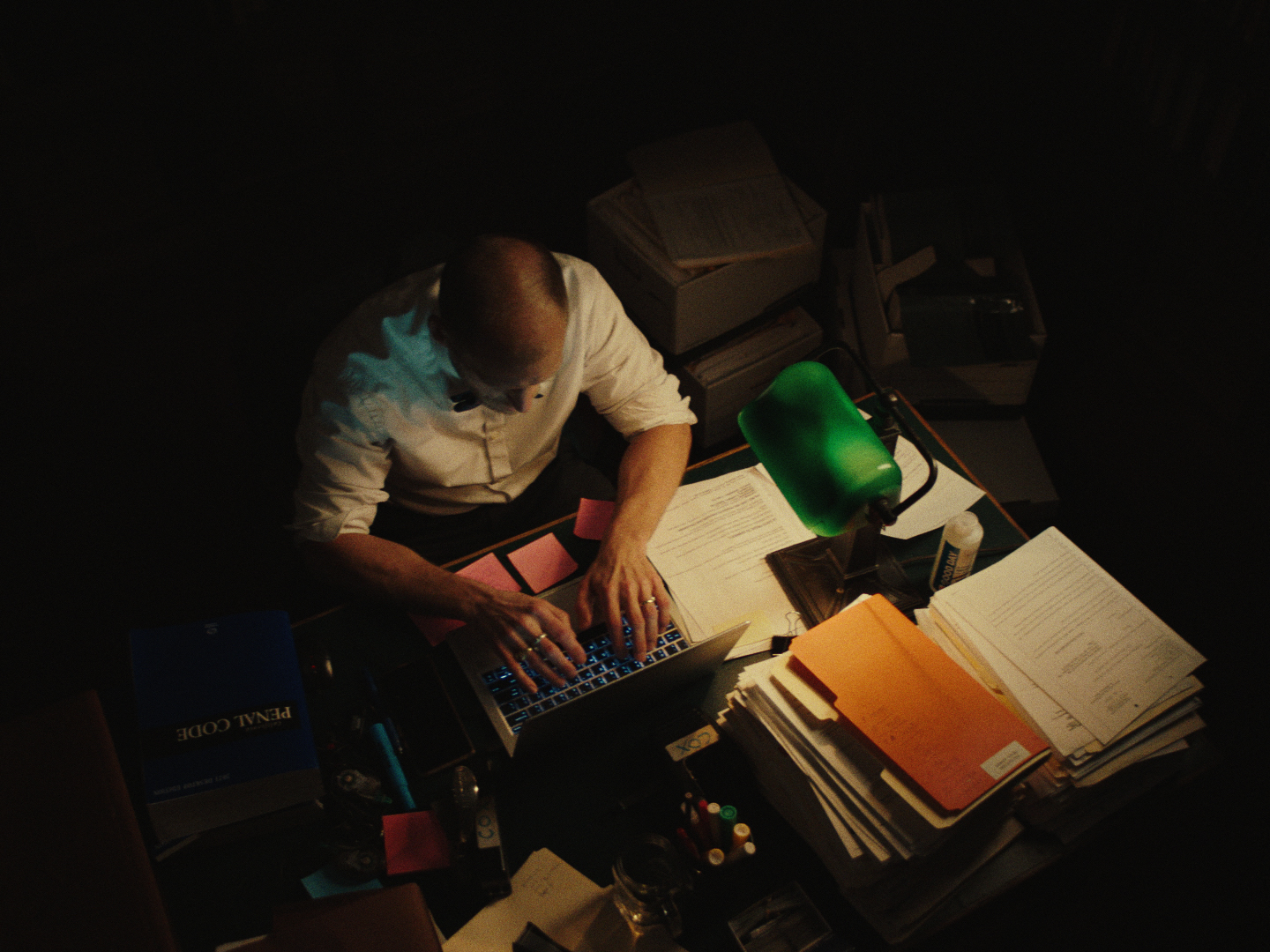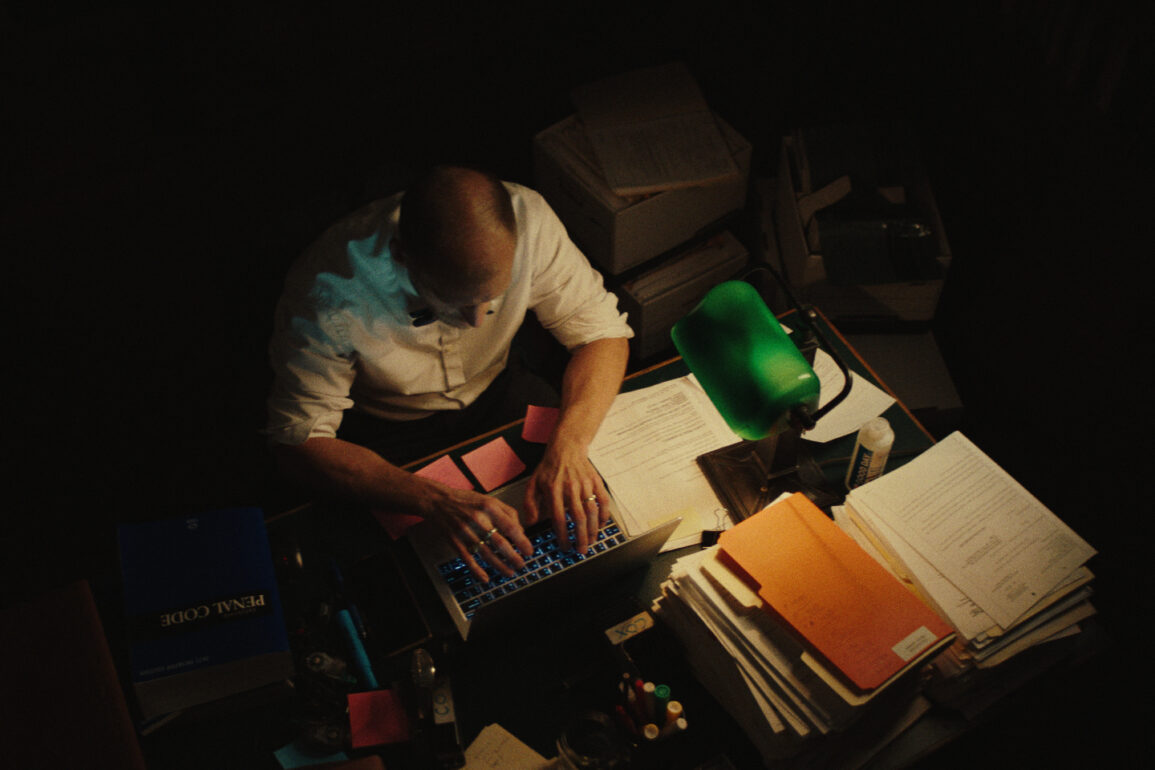
When Academy Award-winning filmmaker Ben Proudfoot was growing up, the backseat of his family’s car was often crammed with bankers’ boxes full of paper. They were case files from the law practice of his father Gordon Proudfoot, a one-time radio DJ who became the president of the Canadian Bar in 1995. After his father’s death in 2020, Proudfoot sought closeness to the sense of mission that drove his father’s career—so he was drawn to telling the story of a lawyer trying to make the system better, and a client whose criminal-justice story could make viewers rethink their ideas about forgiveness.
Proudfoot had reached out to the Los Angeles County Public Defenders’ Office, which put him in touch with attorney Noah Cox, from the department’s Neurocognitive Disorders Team, which works with clients with cognitive disabilities. “As a documentary filmmaker, you’re looking for someone who probably would rather not be in the documentary but believes so much in what you’re trying to do that they still want to help,” Proudfoot says. “Noah was that correct balance of somebody who probably would rather not seek the spotlight, but because he believed in the work, was willing to engage.”
Cox was working with a client named Johnny Reyes, a disabled young man who faced a potential sentence of up to 20 years after the police were called about an altercation with his father figure. Cox and Reyes hoped to be among the first to take advantage of a new California program that could divert defendants like Johnny into treatment rather than incarceration. Proudfoot’s film Forgiving Johnny tells the story of that effort. “Most Americans who I’ve met put a high value on second chances and forgiveness and are not punitive people,” Proudfoot says. “And yet the system is highly punitive.”
Cox answered questions via email about the process. The following interview has been edited for clarity and length.
TIME: Why did you become a lawyer, and why a public defender? What are the qualities that make a good public defender?
NOAH COX: I became a lawyer because I wanted to be a public defender. My parents were very firm in their commitment to education and modeled kindness to people who are less fortunate. So I think I was naturally drawn to public defense as a way to serve those who didn’t have many of the advantages I had when growing up. I think being a public defender is an act of service to individuals who are forgotten, ignored, and misunderstood.
Given that Johnny’s case was one of the first attempts to divert a developmentally disabled defendant from prison to treatment, what did you learn in the process? How will his case affect the way you approach future cases?
The number one thing I learned was how much change can be accomplished by small actions from many people who are united in their purpose. I don’t think Johnny would be doing nearly so well without everyone’s dedication—I know it means so much to him that everyone is rooting for him. So going forward, I have tried to produce similarly collaborative environments for my other developmentally disabled clients to provide the community support that allows and encourages them to flourish.
You talk about how the L.A. County Public Defender’s Office is the oldest and largest public defender’s office in the world. What are the additional challenges for a public defender in such an overwhelming system?
I think every deputy public defender’s biggest struggle is an internal battle. When faced with so many situations where creating change seems so difficult, it is easy to lose your own passion and energy. I know this is something that I struggle with consistently but there are so many wonderful people trying their best to change the world that it is inspiring simply to come to work.
You work in the Neurocognitive Disorders Team. Do most public defender’s offices have such a unit and why is it important for defendants like Johnny?
The Los Angeles County Public Defender’s Neurocognitive Disorders Team is unique. To my knowledge there is no other Public Defender’s Office that has a team specifically dedicated to helping adults with cognitive disorders such as intellectual disability, traumatic brain injury, and dementia. But people with cognitive disorders are vastly overrepresented within the justice-involved population, likely because of their congenital difficulty with learning and foreseeing long-term consequences of actions. Therefore, we need to recognize that these people need extra support and guidance if we want them to succeed. Expanding our knowledge about how these disorders affect individuals is critical to providing people real options to change their lives.
You speak about how it’s difficult for a defendant like Johnny to find what you call “grace” in a rigid justice system. What does the word grace mean to you in a case like this?
The situation in Johnny’s case demonstrated the system at its finest. From the Judge, the prosecutor, the probation department, the treatment professionals—everyone did more than necessary to ensure that Johnny was given the most appropriate considerations. The law instructs people on their minimum expectations, but the system can only achieve grace when people go beyond the bare minimum.
The film tells the story of Johnny Reyes’ case of course, but you also delve into the history of the public defender system in the U.S.—a system that sounds so honorable, but one that’s woefully underfunded and unable to address a huge need. What are three things that you feel could help?
We have come to realize that most individuals facing criminal charges have a mental health issue and/or a cognitive disorder. So the areas where we need the most help are to help identify, diagnose, and treat individuals who have those extra needs. Long-term care and treatment for these individuals is necessary to ensure they can move forward positively and to reduce the burden on the justice system and the community in general. In my opinion the single biggest need is a comprehensive treatment system that doesn’t have gaps.
Additionally, we have around 15,000 people in custody in Los Angeles County who are awaiting the outcomes of their cases. While the jail clinical staff are doing their best to provide appropriate treatment, many people with increased needs go unnoticed, under-noticed, or misunderstood because of a lack of treatment resources within the jail facilities. We need to increase our attention to these individuals to make sure we properly and rapidly identify their needs so that we can transition them to the support they need for success.
And finally, the Neurocognitive Disorders Team is built on the premise of maximizing each individual’s impact on our client’s lives. As one of the attorneys on the Team, I am fortunate to work with amazing Paralegals and Social Workers who do most of the work to ensure my client’s needs are properly identified and addressed. My hope is that as a system we can rethink how we treat clients with mental health and cognitive needs. But Paralegals and Social Workers have more suitable training and expertise to ensure that these people are properly identified and treated. So I think every Public Defender needs assistance from these other outstanding professionals.
The film focuses on diversion (treatment) for developmentally disabled defendants. Can you talk a bit about how the nation is slowly adopting programs to offer diversion instead of prison time, and is California ahead of the curve?
California has one of the best treatment frameworks for people with developmental disabilities. If someone is diagnosed with a developmental disability in California, they are entitled to services from local organizations called Regional Centers. These organizations are responsible for providing comprehensive treatment plans that last a person’s entire life and ensure that person has a safe place to live as well as all other basic necessities. California’s new laws specifically allowing for the diversion of developmentally disabled individuals who face felonies are transformative. They clearly show an understanding of the significant needs these people have and encourage a supportive and compassionate model of treatment. I’m inspired to be working in California where the laws are evolving to address the needs of the developmentally disabled population both within and outside the justice system.
- Inside Elon Musk’s Struggle for the Future of AI
- Is Pink Still a ‘Girl Color’? An Exploration
- Meta Takes Down ‘Largest Ever’ Chinese Influence Operation
- There’s Now an At-Home Menopause Test
- How Europe’s Poorest Country Could Win the Green Energy Race
- The Most Anticipated Books, Movies, TV, and Music of Fall 2023
- Podcast: Jean Twenge on How Smartphones Destroyed Gen Z
- Want Weekly Recs on What to Watch, Read, and More? Sign Up for Worth Your Time
This post was originally published on this site be sure to check out more of their content.







